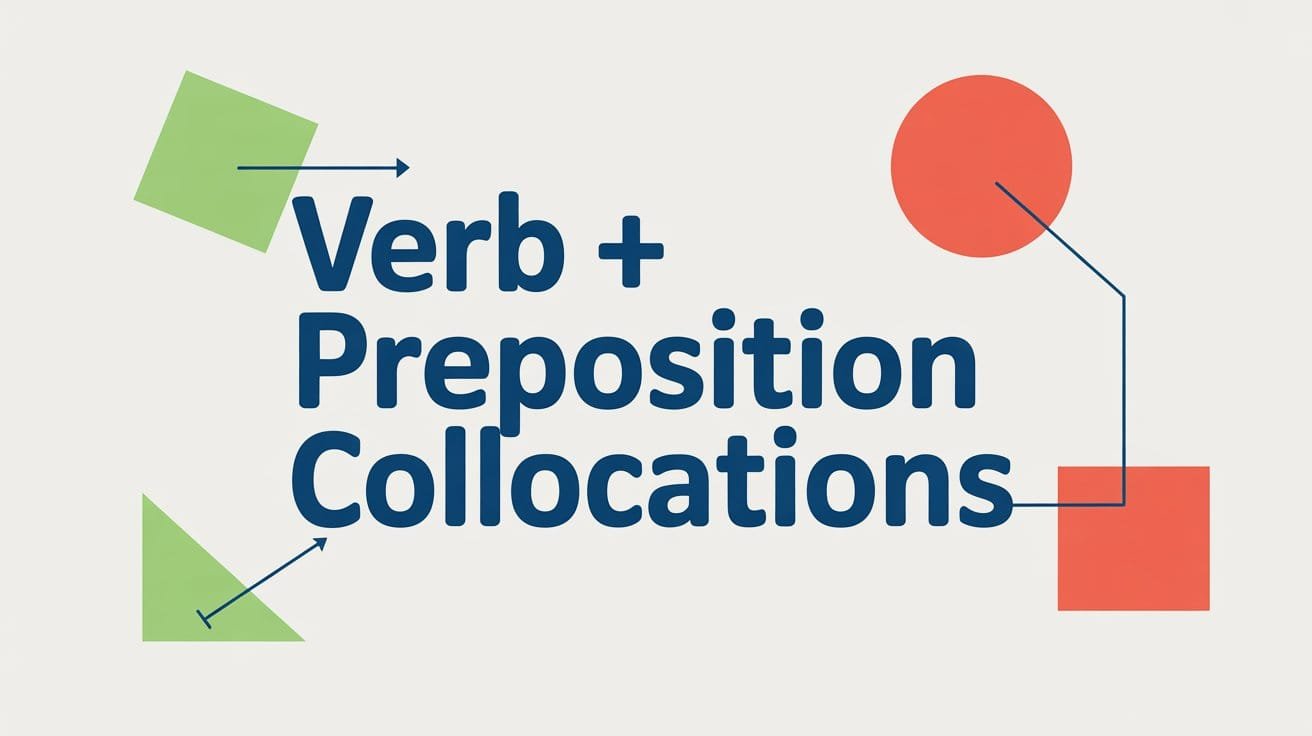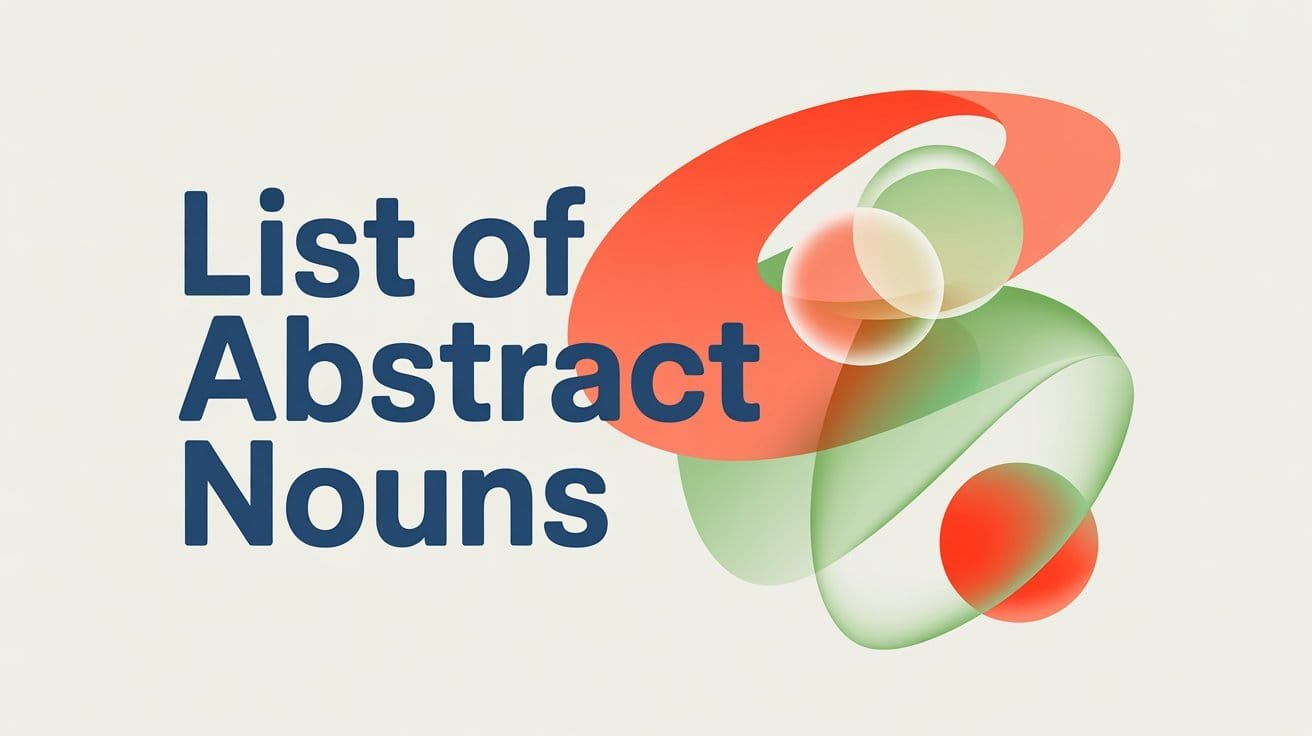In English, certain verbs naturally pair with specific prepositions to create expressions that sound correct and familiar. We say depend on, not depend at, and believe in, not believe to. These natural combinations are called verb + preposition collocations, and they’re essential for sounding fluent and accurate.
Even advanced learners sometimes choose the wrong preposition because translation from another language doesn’t always work. Understanding which preposition fits each verb helps you use English naturally in both speech and writing.
In this guide, you’ll learn the most common verb preposition collocations with their meanings and clear examples. You’ll also see how small preposition changes can completely alter the meaning of a verb.
Common Verb + Preposition Collocations (with Meaning and Examples)
Verb + preposition collocations are everywhere in English. The preposition often changes the meaning of the verb, so using the right one is important. Below are some of the most common combinations, explained with meanings and examples.
1. Depend on
Meaning: To rely on someone or something.
Example: You can always depend on your friends for support.
2. Believe in
Meaning: To have faith or confidence in someone or something.
Example: I believe in lifelong learning and self-improvement.
3. Belong to
Meaning: To be owned or possessed by someone.
Example: This book belongs to my sister.
4. Focus on
Meaning: To give attention or concentration to something.
Example: The teacher asked us to focus on the main idea.
5. Apologize for
Meaning: To express regret about something.
Example: She apologized for arriving late to the meeting.
6. Succeed in
Meaning: To achieve something you planned to do.
Example: He finally succeeded in passing the driving test.
7. Participate in
Meaning: To take part in an activity or event.
Example: Students are encouraged to participate in school programs.
8. Wait for
Meaning: To stay somewhere until someone or something arrives.
Example: We’re waiting for the train to depart.
9. Laugh at
Meaning: To find something or someone funny or ridiculous.
Example: They all laughed at his unexpected joke.
10. Listen to
Meaning: To give attention to what someone says or to sounds.
Example: Please listen to the instructions carefully.
11. Look after
Meaning: To take care of someone or something.
Example: She looks after her younger brother after school.
12. Talk about
Meaning: To discuss a topic.
Example: Let’s talk about your weekend plans later.
13. Complain about
Meaning: To express dissatisfaction or annoyance.
Example: He complained about the noisy neighbors.
14. Agree with
Meaning: To have the same opinion as someone else.
Example: I completely agree with your idea.
15. Deal with
Meaning: To handle or manage a situation or problem.
Example: The manager will deal with customer feedback personally.
16. Suffer from
Meaning: To experience pain, illness, or a difficult situation.
Example: Many people suffer from seasonal allergies.
17. Apply for
Meaning: To formally request or seek something (like a job or course).
Example: He applied for a scholarship abroad.
18. Rely on
Meaning: To trust or depend on someone or something.
Example: You can’t always rely on luck to succeed.
19. Look for
Meaning: To search for something or someone.
Example: I’m looking for my keys; have you seen them?
20. Dream of
Meaning: To imagine or hope for something you want in the future.
Example: She dreams of becoming a writer one day.
Verb + Preposition Collocations Grouped by Theme
Grouping collocations by topic makes them easier to learn and remember. The following examples are organized around everyday themes like communication, emotions, work, and daily activities.
Communication and Interaction
These collocations help you talk about speaking, listening, and responding naturally.
Examples:
- talk about — We talked about the movie after class.
- speak to — She spoke to her manager about the schedule.
- write to — Please write to me once you arrive.
- listen to — He listened to the podcast carefully.
- respond to — They responded to the client’s email immediately.
- apologize for — He apologized for interrupting the meeting.
- agree with — I agree with your explanation.
- argue about — They argued about where to go for dinner.
- comment on — The teacher commented on my essay.
- complain about — Residents complained about the noise.
Emotions and Feelings
These collocations describe attitudes, reactions, and emotional states.
Examples:
- care for — She cares for her elderly parents every day.
- worry about — Don’t worry about small mistakes.
- depend on — Children depend on their parents for support.
- hope for — We all hope for better results next time.
- suffer from — He suffers from anxiety before exams.
- recover from — She’s recovering from a cold.
- feel about — How do you feel about the new policy?
- dream of — He dreams of traveling the world.
- cry about — She cried about losing her wallet.
- laugh at — They laughed at his clever joke.
Work and Study
Used to discuss professional or academic tasks and responsibilities.
Examples:
- apply for — She applied for a research internship.
- focus on — Focus on quality, not just quantity.
- participate in — Students participated in the language contest.
- prepare for — He’s preparing for the final exam.
- rely on — We rely on teamwork to finish projects.
- result in — The delay resulted in a missed opportunity.
- specialize in — She specializes in digital marketing.
- succeed in — They succeeded in completing the project early.
- collaborate with — Our team collaborated with a local company.
- work on — He’s working on a new presentation.
Daily Life and Routine
These are used frequently in casual conversations.
Examples:
- wait for — I waited for the bus for 20 minutes.
- look for — She’s looking for her phone again.
- look after — He looks after the pets when I’m away.
- pay for — Did you pay for the tickets already?
- depend on — Dinner plans depend on the weather.
- stay at — We stayed at a quiet guesthouse near the beach.
- arrive at — They arrived at the airport on time.
- live with — He lives with his grandparents.
- borrow from — I borrowed this book from the library.
- deal with — She deals with customer requests every day.
Thinking and Decision-Making
These collocations describe actions related to ideas, opinions, or judgments.
Examples:
- think about — Think about your answer before replying.
- decide on — They decided on a new marketing strategy.
- agree on — Everyone agreed on the final plan.
- believe in — I believe in setting realistic goals.
- concentrate on — Please concentrate on your work.
- object to — The committee objected to the proposal.
- rely on — We rely on accurate data for analysis.
- consist of — The team consists of five members.
- approve of — She doesn’t approve of that behavior.
- result from — The problem resulted from poor planning.
Tips to Learn and Use Verb + Preposition Collocations Effectively
Verb + preposition collocations can be tricky at first, but with the right approach, you can learn them naturally and use them with confidence. Here are some practical ways to make them part of your everyday English.
Learn Through Examples, Not Translation
Instead of memorizing a list, learn collocations in meaningful sentences. For example, “He apologized for the delay,” is better than remembering “apologize + for.” Learning this way helps you recall the structure when you actually speak or write.
Group Collocations by Theme or Verb
Organize collocations that share a common verb or topic.
Example (by verb): depend on, rely on, insist on, focus on
Example (by theme): Communication: talk about, listen to, speak to, respond to
Practice Using Them in Your Own Sentences
When you learn a new collocation, immediately use it in writing or speech.
Examples:
- She applied for a part-time job.
- We agreed on the final decision.
- He believes in hard work.
Review Regularly
Review your collocation notes weekly, write short paragraphs using them, and practice aloud. Over time, you’ll use them automatically without thinking about prepositions.



